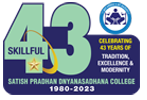
Dnyanasadhana, Thane Society's
Satish Pradhan Dnyanasadhana College, Thane
(Arts, Science and Commerce)
Re-Accredited "B+" Grade (CGPA 2.69) by NAAC, ISO 21001:2018 (Certified)
Affiliated To University of Mumbai

Indian Knowledge System (IKS)
Introduction
The Macaulian system, a formal education system that was inherited by Indian officials from Britain, has prevented young pupils from accessing the wealth of ancient Indian knowledge. The system cites lack of scientific value and rigour as its justification. It could be argued that this viewpoint is erroneous. But the reality is different. One of the few ancient civilisations still in existence is ours, and it has a vast store of knowledge that its ancestors built and that may be very beneficial to any kind of society. It gives the younger generation new chances to absorb the accumulated wisdom and create new knowledge, as well as the ability to comprehend the thinking processes and frameworks and critique received wisdom in a modern setting.
In spite of over a millennium of relentless foreign invasions, knowledge practices have mostly endured and are verbally transmitted from generation to generation. In the past millennia, there have also been attempts to document the customs and expertise in writing. But for the past 200 years, this knowledge has been marginalised and the Western paradigm of knowledge has been forced upon Indian society. There were no real attempts to explicitly include indigenous knowledge into the curriculum even after independence.
For every community, though, understanding the thought processes and information base established by the ancestors is invaluable. It makes it possible for the current generation to synthesise new knowledge and comprehend cognitive processes and frameworks. It may be argued that no culture can ever thrive by merely breaking ties to the past and adopting new concepts that are incompatible with native ways of thinking and doing. After a while, there would be a strong urge to go back, and Indian culture is presently experiencing this.
The government and policymakers have acknowledged this and taken a number of actions to meet this need. Introducing an Indian Knowledge System (IKS) course in higher education establishments is one of the approaches.
IKS Committee
Adv. Suyash Pradhan – Convenor
Dr. Anita Dakshina – Co – Convenor
Mission
The vision of the IKS Department of Satish Pradhan Dnyanasadhana College, Thane is to help the Government to rejuvenate and mainstream Indian Knowledge Systems for the contemporary world.
Objectives
The objective of the IKS Department of Satish Pradhan Dnyanasadhana College, Thane is to completely decolonize Indian mind by generating interest and healthy critical reverence for the unbroken knowledge traditions of Bhārata for the welfare of the world.
To create an IPR community which embraces IP management and due diligence.
Action Plan
The IKS Department of Satish Pradhan Dnyanasadhana College, Thane is equipped with well – Trained staff members comprising of Convenor and Co-Convenor who have been trained by UGC in the field of IKS. The Convenor of the Department has completed Master Trainer Program from UGC and IKS Division, Department of Education, Government of India.
The Department plans to organize training sessions and guidance workshops for IKS Faculties of the College. The Department also encourages one on one sessions with various Faculties to promote methods to teach IKS.
Conference/ Workshop
In view of changing education pattern as per NEP2020 guidelines, college organised National Level NEP 2020 Conclave. Thic conclave led imopratnce on various issues including IKS. The Department plans to have an extensive workshop on IKS and its elements where Resource Persons from across India shall come and share their knowledge about various branches of IKS.
Syllabus
Future Plan
The College aims to have a full fledged IKS Centre with adequate learning Resources in order to act as model IKS Centre for all nearby Colleges. The College also aims to promote IKS through various activities and set – up IKS Wall in the College. Awareness Sessions and IKS Activities and Games shall be developed in future to promote IKS in a Healthy and Joyful Manner.
